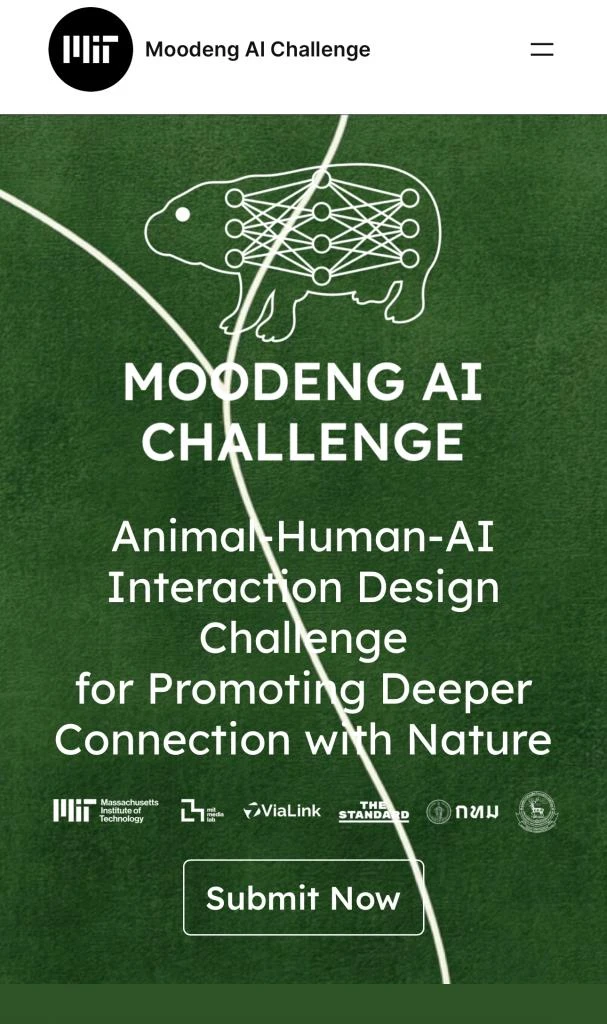On July 9, 2025, during the Ecological Intelligence Symposium, the winners of the Moodeng AI Challenge 2025 were officially announced. The event was spearheaded by Dr. Napat Jatusripitak, Managing Director of ViaLink, in collaboration with Asst. Prof. Dr. Pat Pataranutaporn from MIT Media Lab, the Zoological Park Organization of Thailand, and other partner organizations. The competition accepted submissions from January 21 to May 1, 2025.
This groundbreaking competition aimed to reshape the way humans and animals interact—through the power of artificial intelligence. Inspired by the globally famous pygmy hippo named Moodeng, the challenge invited innovators worldwide to develop AI technologies that bridge the connection between humans, animals, and nature. The grand prize included $3,000 for the overall winner, $500 for each track winner (excluding honorable mentions), a Certificate from MIT, and an invitation to join a special birthday celebration with Moodeng.
Award Highlights
The Best Overall Award went to Team OCTROBRAIN, a group of developers from Mexico consisting of:
- Brenda Scarleth Gutierrez Torres, applied AI scientist
- Adrián Alemán Zapata, PhD student in neuroscience
- Jose Alejandro Luna Martinez, MLOps engineer
- Ever Solis, software development engineer
They presented their project “MonkeyEye”, an AI innovation designed to assist zookeepers and conservation staff in efficiently and accurately monitoring the health and detecting abnormalities in primates. The system uses automated video analysis to assess behavioral patterns, aiming to reduce the risk of severe illness and improve animal welfare. Moreover, the system is adaptable and scalable, with the potential to be applied to other animal species beyond primates in the future.
The AI for Decoding Animal Communication award went to Team MOOMOO AI, developed by Thai youth Kantheer Wattananan, Jirasin Techawut, and Naromon Jin-ai from Montfort College in Chiang Mai province.
The team created an artificial intelligence chatbot specifically designed to analyze and understand the behavior of Moodeng, the pygmy hippopotamus at Khao Kheow Open Zoo. They employed advanced object detection technology, training the AI with over 1,400 CCTV images of Moodeng to enable it to accurately recognize and identify key behaviors in real time—such as eating, sleeping, swimming, and walking.
In addition, the AI can generate descriptive captions under the video footage to explain what’s happening, such as “Moodeng is swimming” or “Moodeng is sleeping”, allowing both caretakers and visitors to instantly understand the hippo’s activities.
The AI for Augmenting Zoo Keepers and Veterinarians award went to Chawaphon Netisingha, a student from The Prince Royal’s College in Thailand. His project, titled “Moodong”, is an animal behavior analysis system capable of simultaneously identifying posture, emotion, hunger cues, and unique behavioral patterns in animals.
What makes this project stand out is its use of self-supervised learning, which eliminates the need for manually labeled data. This approach makes the system a powerful and scalable tool for modern animal caretakers, enhancing their ability to monitor and respond to the needs of the animals more effectively.
The Honorable Mention Awards were given to Team CHANGGPT_HLCLIP and Team CALKEE.
Team CHANGGPT_HLCLIP developed an intelligent AI assistant designed to support zoos and elephant conservation centers. Their system can automatically filter and generate highlight videos of elephants from hours of raw footage. Users simply type a command such as “elephant playing in water”, and the AI will search for and edit the relevant moments into ready-to-use short clips.
This innovation significantly reduces the workload for caretakers and marketing teams, streamlining the process of creating content for public outreach and conservation awareness campaigns.
Team CALKEE, consisting of Lominta Chongrakvit and Krit Kritwong, fourth-year students from the Department of Industrial Engineering, Faculty of Engineering, Thammasat University, received an Honorable Mention. Their project was developed under the guidance of Asst. Prof. Dr. Supamas Suchatanon, a faculty member in Industrial Engineering at Thammasat University, along with Dr. Benjaphon Lorsanyalak and Dr. Nichanan Siriarchawattana, veterinarians from Panalai Animal Hospital.
They created a mobile application designed to help rabbit owners quickly and easily perform basic health checks on their beloved pets.
From a little pygmy hippopotamus named Moodeng to the global AI stage, Thai youth have proven that technology doesn’t belong only in high-tech labs or giant corporations—it can begin with a small idea close to home.
When young Thais learn to use AI to understand animals and nature, they are also learning to use technology to understand the world and care for our shared future.
This is one small step by a new generation that just might change the entire world one day.

